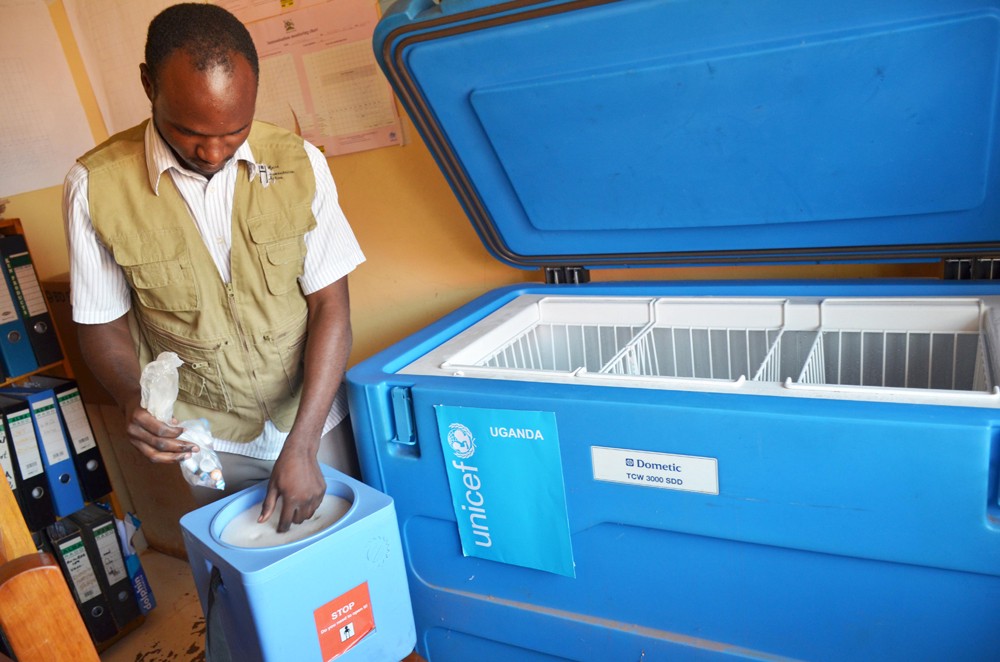NEW DELHI, Dec 9: The centre has planned to start sending to the states and union territories additional vaccine storage equipment from Thursday as the first step for launching the vaccination drive in full swing as more than 60 heads of foreign missions were taken to Hyderabad on Wednesday to visit two biotech companies working on developing indigenous Covid-19 vaccine “Covaxin.”
Three vaccine candidates, including that of Pfizer, Serum Institute of India and Bharat Biotech, have applied for emergency use authorisation. While the Central Drugs Standard Control Organisation reviews the applications, the Centre is readying the ground work for vaccine delivery.
A spokesman of the union health ministry said the present cold chain system consisted of 85,634 equipment, including all auxiliary equipment as well like walk-in coolers, transport box etc, for storage of vaccine at about 28,947 cold chain points across the country. The Centre had already asked the states and UTs to assess their cold-storage requirement, if they need extra walk-in coolers, walk-in freezers, deep freezers, ice-lined refrigerators etc., as the present equipment are also used for other immunisation programmes.
The current cold chain is capable of storing additional quantity of Covid-19 vaccine required for first 3 crore people — health care workers and frontline workers, the ministry has said.
Health Though a final blueprint for the mass vaccination drive was yet to be prepared, the priority was certain to be given to the health care workers, frontline staff and the people with co-morbidities in that order. All three groups can be vaccinated at the same time, depending on the availability of the vaccine.
The ministry sources said in the first month, there could be a limited supply of vaccine, but in the following months, supply would be augmented
The government has also planned to deploy 1.54 lakh out of 2.39 lakh vaccinators (auxiliary nurse midwife used for the present 13 immunisation programmes in progress in the country) for Covid vaccination.
Centre will launch Co-WIN app to monitor the entire process. People will be able to register themselves for vaccination through the app. In each session, 100 people will be vaccinated as at least 30 minutes will be required to complete the process of vaccinating each recipient.
The health ministry has also zeroed in on five principles to carry out the vaccination drive: One, orderly, smooth implementation driven by technology; Two, no compromise of existing healthcare services, especially national programmes and primary care; Three, utilise experience of elections and universal immunisation programme; Four, ensure people’s participation; Five, no compromise on scientific and regulatory norms, other SOPs.
In Hyderabad, the foreign diplomats who visited Bharat Biotech were briefed by its chairman Krishna Ella on the development of Covaxin. Ella pointed out that the medical industry was working to realise Prime Minister Narendra Modi’s dream of making vaccines available for humanity.
Covaxin is India’s indigenous Covid-19 vaccine developed by Bharat Biotech in collaboration with the Indian Council of Medical Research (ICMR) and National Institute of Virology (NIV). Bharat Biotech recently started phase-III trials for Covaxin, which seems to have been largely safe and significantly triggered the immune response needed to fight off the infection.
Ella also told the heads of missions that 33% of global vaccines are produced in Hyderabad’s Genome Valley, a high-technology business district spread across 600 square kilometer area. Hyderabad also has the largest US Food and Drug Administration (FDA)-approved vaccine facilities, he said.
The diplomats will also visit Biological E, whose vaccine candidate is set to start early phases I and II trials.
The visit by the diplomats to Hyderabad is part of India’s efforts to develop partnerships for the manufacturing and delivery of vaccines. It is also a follow-up to the November 6 briefing by the external affairs ministry for the diplomatic corps in New Delhi on trials of vaccines underway in the country and efforts to manufacture and deliver the doses.
The diplomats, who flew to the southern city in a special Air India flight with all Covid-19-related precautions, are drawn from different parts of the world. Besides representatives of countries in the region such as Afghanistan and Bhutan, the group included South Korean envoy Shin Bong-kil and heads of mission of African countries.
“More than 60 heads of missions are being taken to leading biotech companies in Hyderabad. This is the first such visit and it will be followed by trips to facilities in other cities,” official sources said.
Given India’s position as the world’s largest manufacturer of vaccines, many countries, especially developing nations, are looking to New Delhi for a helping hand with the doses. Amid the pandemic, India had rushed essential medicines and equipment to some 150 countries around the world.
India is looking for partners to co-produce vaccines so that they can be manufactured faster and distributed on a larger scale. New Delhi could offer free supply or trial partnerships to South Asian, European, West Asian, African and Latin American countries for the vaccine to ensure they can adequately protect their populations from Covid-19, official sources hinted.
Meanwhile, in a related development, a team in the United States led by an Indian-origin scientist has developed a rapid, ultrasensitive Covid-19 test using a paper-based electrochemical sensor that it claimed can detect the presence of the novel coronavirus in less than five minutes.
The researchers from the University of Illinois created a graphene-based electrochemical biosensor with an electrical read-out setup to selectively detect the presence of SARS-CoV-2 genetic material.
According to the research published in the journal ACS Nano, there are two components to this biosensor: a platform to measure an electrical read-out and probes to detect the presence of viral RNA.
Beyond Covid-19, the research team also foresees the system to be adaptable for the detection of many different diseases.
(Manas Dasgupta)

